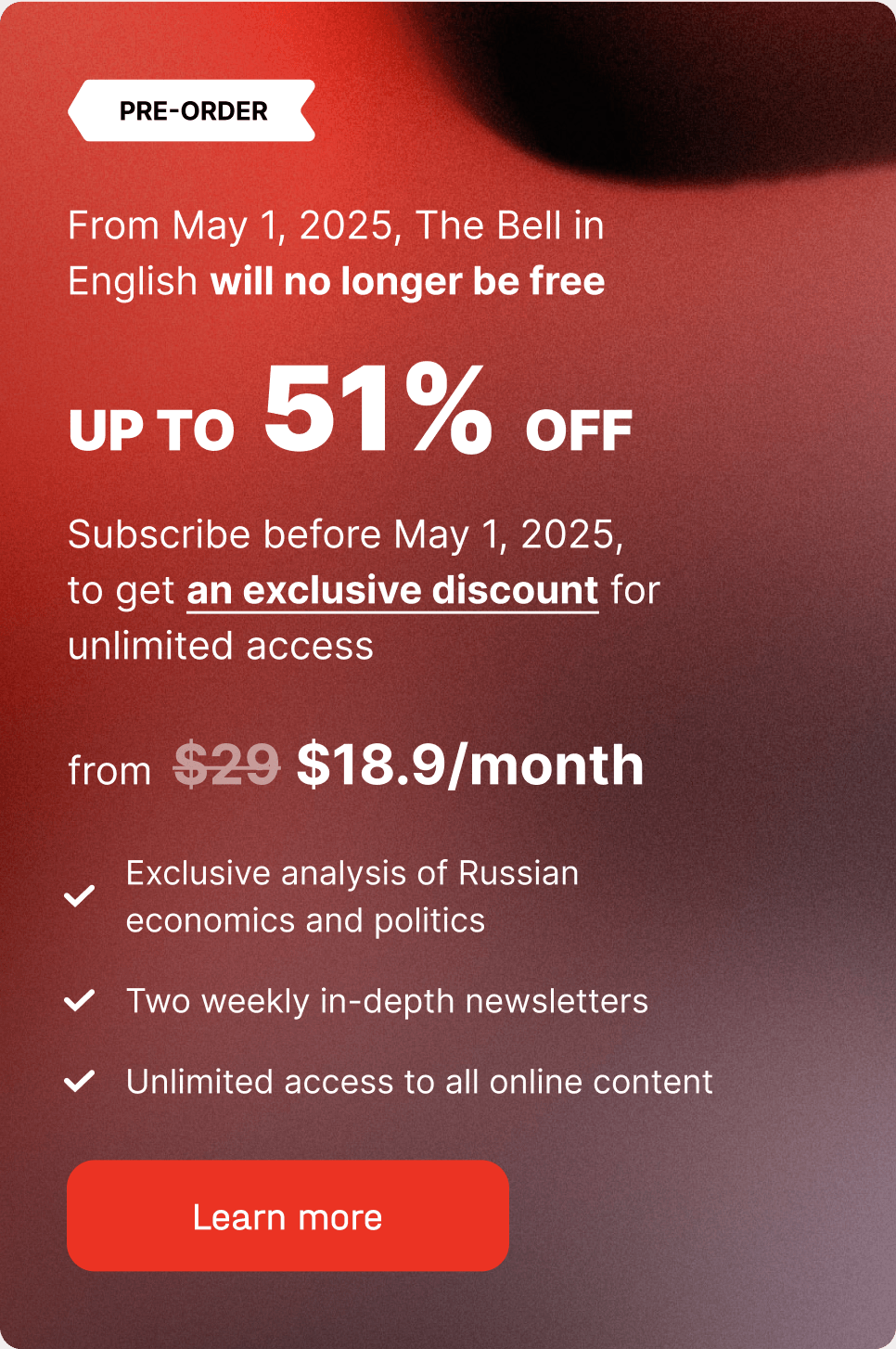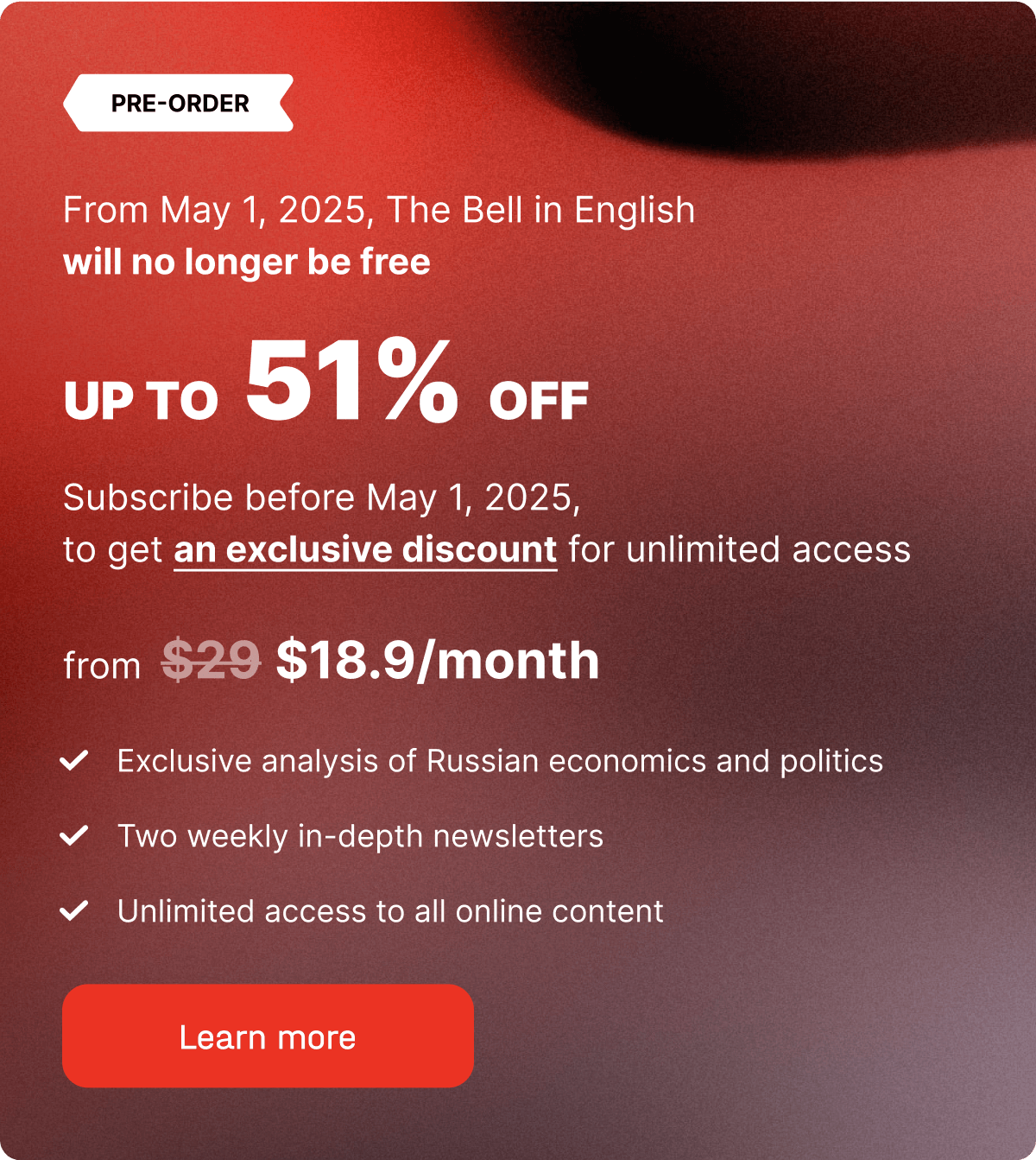
The Russian economy is in good shape — if you cherry pick data
Hello! Welcome to your weekly guide to the Russian economy — brought to you by The Bell. This time we focus on what Putin said at a major economic forum in Moscow. In our top story, we look at how the president’s economic optimism relies on a selective reading of the numbers. We also look at why Putin’s still seeking to woo foreign investors.
Official confidence in Russian economy is misplaced
Russian President Vladimir Putin tried hard to persuade officials and businessmen that the economy is doing well in a speech at the annual Russia Calling forum, which is run by state-owned bank VTB. However, recent data, as well as comments from senior officials, suggests the real picture is not nearly as rosy as the Kremlin would like.
Putin’s words vs. reality
Putin’s key talking point at the Thursday event was Russian GDP, which could increase by as much as 3.5% this year. Forecasts have been improving through the year: in April, the Economic Development Ministry predicted growth would be 1.2%; in September, they raised that to 2.3%. Last month, Putin was talking about growth being “better than 3%.” As we have reported previously, the main driver of economic growth at the moment is state spending, both directly and via subsidized borrowing (such as preferential mortgages).
However, there might be a limit to how far even this growth can go. Despite plans for further spending increases, the Central Bank has already flagged indicators that a slowdown is around the corner. “The first signs of a cooling in aggregate demand can be noted in the dynamics of financial flows in most sectors, as well as a decline in businesses’ assessment of the current level of demand for their products,” the regulator said in a report this week.
Putin also boasted about a 7% rise in salaries in 2023, and a 4.4% increase in real household incomes. According to data published Wednesday by the State Statistics Service (Rosstat), the numbers could actually be even higher: in the third quarter, salaries were up 8.7% year-on-year, and real incomes rose 4.9%. However, real wage increases are outstripping both economic growth, and increases in productivity (figures suggest productivity has risen 1.7% – half as much as GDP and a quarter of the rise in real incomes). And this is usually a sign of a warped economy. In Russia, we’ve seen this before during periods of rising oil prices. But now it’s being caused by increased state spending, and a labor shortage.
Rising inequality in the economy
Rising incomes since the start of the war in Ukraine mean fewer Russians are living in poverty. In the 12 months before October, the number of people earning under 14,000 rubles ($150) a month fell from 12.9% to 10.7% of the population. This data will undoubtedly be featured prominently in propaganda ahead of the presidential elections in March.
However, the gap between rich and poor is not falling as rapidly as it was before, with the Gini coefficient, which measures inequality, ticking up to 0.404 (in recent years, it has been below 0.4). There are several reasons for this. The number of Russians earning over 75,000 rubles a month was up 3.3 percentage points to 15.8% in the 12 months before October. And high inflation means that the poor spend a greater share of their income on essentials, while the wealthy benefit from better returns on their savings.
Another factor could be the subsidized loans that are so unpopular with Central Bank head Elvira Nabiullina. At the Russia Calling forum, Nabiullina again criticized this policy, saying that “everyone is paying for loans to a select few,” and warning the more the government subsidizes borrowing, the longer interest rates will have to be kept high.
Finance Minister Anton Siluanov gave the impression he backed Nabiullina, saying he was prepared to increase the deposit needed to secure a subsidized mortgage. However, this would do little to solve the problem — instead, those fortunate enough to get such a loan will be subsidized not only by those who are ineligible, but those who would be entitled but who can’t make the initial down payment. Like inflation, mortgage subsidies are a regressive form of taxation that benefit richer Russians at the expense of the poor.
Jitters in the business community
Siluanov made it clear at the forum that, next year, the government will overhaul taxes for big business – we can assume this means tax hikes. However, some exporters are feeling less and less confident. In its November Financial Stability Review, the Central Bank concluded that most export-oriented Russian companies faced declining profitability, and worsening debt burdens. “The main reasons are the decline in export revenues and incomplete replacement of supplies from Europe with deliveries to Asia,” the report said.
However, confidence is rising in the manufacturing sector, which includes the defense industry. In his speech at Russia Calling, Putin said 98% of Russia’s GDP growth in 2023 came from the manufacturing sector, trade and services, with just 2% from resource extraction. “Now let them say that Russia is just a gas station,” the president boasted. Putin is right – but, of course, he did mention that the reason is the full-scale invasion of Ukraine.
Why the world should care
Russian officials are trying to be as optimistic about the economy as possible, but they have to be selective with their figures. There are already some signs of an economic slowdown. If these worries reach the Kremlin, it will make it much more difficult to predict the make-up of a post-election cabinet, as well as the extent of tax increases.
Putin shows a path for foreign investors to remain in Russia
Another major topic in Putin’s speech at Russia Calling — a popular event among foreign investors until the full-scale invasion of Ukraine – was foreign investment. The president tried very hard to prove that, despite the war, Russia was still a great place for foreigners to put their money.
- This is by no means the first time in recent months that Putin has tried to paint foreign investors as his allies – and suggest that they are only leaving Russia due to pressure from their own governments, not because of moral outrage over the war. At the Russian Union of Entrepreneurs’ Congress earlier this year, one such Italian investor was paraded before the president (it quickly emerged that he was also a Russian citizen). This time, Putin struck a similar note. “Investors, unlike those who tell them what to do, are smart people,” he said. When asked if U.S. investment would return to Russia, Putin responded: “They are invisibly present here, I assure you.” It wasn’t immediately clear what he was referring to.
- Putin praised Western companies that, in his view, have merely gone through the motions of leaving Russia. “Many foreign organizations, regardless of the pressure from their governments, decided that they wanted to continue working in our country. We only welcome this. Many changed names and maintained their presence on the market, or simply transferred their assets to the existing management – to be honest, with a buy-back option. God give them strength, let them work,” Putin said.
- It’s true that many transactions fall under the latter definition: for example, McDonalds sold its Russian business to one of its local franchisees with a buy-out option for 15 years. Local management has bought out at least a quarter of the foreign countries that have left Russia.
- Putin appears to be indicating to foreign companies what they should do if they want to stay in Russia. If they are willing to keep doing business, apparently, the authorities will help them cover their tracks and hold open the door for their return at some unspecified later date.
- However, there are other possible outcomes for foreign investors who stay in Russia. Ahead of Putin's speech, it emerged that Taimuraz Bolloyev, the head of Russian beer company Baltika who was appointed by the Russian state when it seized the company from Denmark’s Carlsberg, has called for its full nationalization. If such a nationalization did go ahead, it would likely be a response to the fuss kicked up by Carlsberg when it publicly accused Russia of stealing its assets. The counterexample is French food products company Danone, which was also seized by the Russian state. Danone, however, kept quiet and, as a result, remains the owner (at least on paper), and still has hopes of making some money from selling up.
Why the world should care
At least a third of Western companies working in Russia have yet to announce any plans to leave. And among those that have said they will exit, by no means all have taken any real steps to make good on their words. That’s the audience Putin is seeking to reach.
Figures of the week
- In the first 11 months of this year, trade between Russia and China reached a historic high of $218.2 billion, according to Chinese customs figures. That’s 15% more than the whole of 2022. Thus, Putin’s aim of reaching a trade turnover of $200 billion was achieved ahead of schedule. Exports from Russia to China were up 50.2% to be worth $100.33 billion in the period; imports were up 11.8% to $117.84 billion.
- Russia’s top exporters increased foreign currency sales to $13.9 billion in October from $12.5 billion the month before. That represents 91% of all the foreign currency earnings of these companies, according to the Central Bank.
- Weekly inflation in Russia slowed sharply from Nov. 28 to Dec. 4, dropping to 0.12%, two-thirds of the figure for the previous week. However, this has less to do with a significant slowdown in price rises, and more to do with a low base.
Further reading
Democracy under siege: Tackling Russian interference in Moldova



PAID SUBSCRIPTION LAUNCH
From May 1, 2025, The Bell in English will no longer be free
From May 1, 2025, all The Bell’s newsletters and online content will be behind a paywall. We have taken this decision so that The Bell can remain financially independent, and maintain our high standards of journalism and economic expertise






